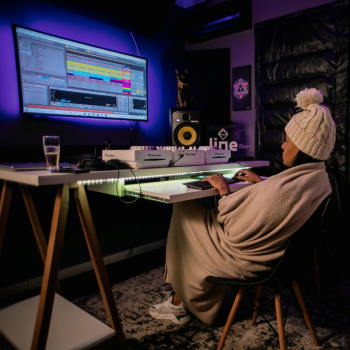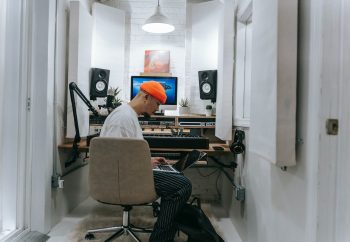7 Essential Music Equipment For Your Home Recording Studio

Having a professional studio is a dream for any aspiring musician or band.
Whether you are a recording artist or someone who wants to become one, having your own place to make music can be deeply rewarding.
In this blog post, we mention some of the essential music equipment you’ll need for your home studio.
1. Studio monitors for accurate sound reproduction
To get the most accurate sound reproduction in your home music studio, invest in a good pair of studio monitors. They are designed to give you a flat response, so you can hear exactly what is being recorded.
If you’re on a tight budget, look for used studio monitors. You can find some great deals on sites like eBay and Craigslist.
Just make sure to test them out before you buy to ensure they are in good working condition.
2. Record player
As a musician, you need to have a record player in your studio. Not only will it allow you to listen to music, but it will also come in handy when you’re trying to record new tracks.
And, if you wonder what record player to use for sampling, make sure to check out online before you buy. That way, you can be sure you’re getting the best quality recordings.
3. A condenser microphone for capturing vocals and acoustic instruments
If you’re planning on recording vocals or acoustic instruments, you’ll need a microphone that can handle both. A condenser microphone is a great option for this purpose.
Condenser microphones are able to pick up a wider range of frequencies than other types of microphones, making them ideal for capturing the nuances of your voice or instrument. They’re also generally more sensitive than other types of microphones, so they can be a great option if you’re looking to add some extra detail to your recordings.
While condenser microphones are a great option for many recording applications, they do tend to be more expensive than other types of microphones. If you’re on a budget, you may want to consider an alternative option.
4. An audio interface to connect the microphone and studio monitors
In order to get high-quality recordings, you need an audio interface that can connect your microphone and studio monitors. This will ensure that the sound is clear and crisp.
Audio interfaces come in all shapes and sizes, so it’s important to find one that is compatible with your other equipment. There are many different features to consider when choosing an audio interface, so it’s important to do your research before making a purchase.
5. A MIDI controller to send digital instructions to software instruments
While a MIDI keyboard is not an acoustic instrument, it’s an important tool for home music studios. A MIDI controller allows you to control the sound of software instruments using keys, pads, or faders. This makes it a versatile tool for both live and studio performances.
MIDI controllers come in all shapes and sizes, so it’s important to find one that fits your needs. If you’re just starting out, a small, simple MIDI controller may be all you need. But if you’re looking for more control, you may want to consider a larger MIDI controller with more features.
6. A laptop or desktop computer to run the music software
Of course, you need a computer to run the music software. A laptop is more convenient if you want to take your studio with you on the go. But a desktop computer will usually have more processing power for running complex software.
Both Macs and PCs can be used for music production, but there are some pros and cons to each platform. Macs are typically more expensive than PCs. They’re also easier to use and have a reputation for being more reliable. But PCs offer more customization options and are often cheaper.
The type of computer you choose is ultimately up to you. But make sure it has enough processing power to run the music software you want to use. And be sure to get a good sound card so you can record high-quality audio.
7. Studio headphones for monitoring the audio signal while recording
Lastly, a good pair of headphones is a must in any home studio, because you need to be able to hear what you’re recording clearly, without bleed-through from other instruments or outside noise. Look for a comfortable pair with decent sound isolation.
Final words
These are 7 handy tools in a home music recording studio. This is not an exhaustive list, but it’s a great starting point. With the right tools, you’ll be well on your way to making amazing music. Good luck!

